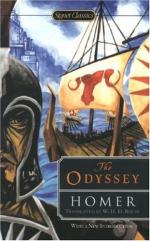“Your discretion, my friend,” answered Menelaus, “is beyond your years. It is plain you take after your father. One can soon see when a man is son to one whom heaven has blessed both as regards wife and offspring—and it has blessed Nestor from first to last all his days, giving him a green old age in his own house, with sons about him who are both well disposed and valiant. We will put an end therefore to all this weeping, and attend to our supper again. Let water be poured over our hands. Telemachus and I can talk with one another fully in the morning.”
On this Asphalion, one of the servants, poured water over their hands and they laid their hands on the good things that were before them.
Then Jove’s daughter Helen bethought her of another matter. She drugged the wine with an herb that banishes all care, sorrow, and ill humour. Whoever drinks wine thus drugged cannot shed a single tear all the rest of the day, not even though his father and mother both of them drop down dead, or he sees a brother or a son hewn in pieces before his very eyes. This drug, of such sovereign power and virtue, had been given to Helen by Polydamna wife of Thon, a woman of Egypt, where there grow all sorts of herbs, some good to put into the mixing bowl and others poisonous. Moreover, every one in the whole country is a skilled physician, for they are of the race of Paeeon. When Helen had put this drug in the bowl, and had told the servants to serve the wine round, she said:
“Menelaus, son of Atreus, and you my good friends, sons of honourable men (which is as Jove wills, for he is the giver both of good and evil, and can do what he chooses), feast here as you will, and listen while I tell you a tale in season. I cannot indeed name every single one of the exploits of Ulysses, but I can say what he did when he was before Troy, and you Achaeans were in all sorts of difficulties. He covered himself with wounds and bruises, dressed himself all in rags, and entered the enemy’s city looking like a menial or a beggar, and quite different from what he did when he was among his own people. In this disguise he entered the city of Troy, and no one said anything to him. I alone recognised him and began to question him, but he was too cunning for me. When, however, I had washed and anointed him and had given him clothes, and after I had sworn a solemn oath not to betray him to the Trojans till he had got safely back to his own camp and to the ships, he told me all that the Achaeans meant to do. He killed many Trojans and got much information before he reached the Argive camp, for all which things the Trojan women made lamentation, but for my own part I was glad, for my heart was beginning to yearn after my home, and I was unhappy about the wrong that Venus had done me in taking me over there, away from my country, my girl, and my lawful wedded husband, who is indeed by no means deficient either in person or understanding.”




